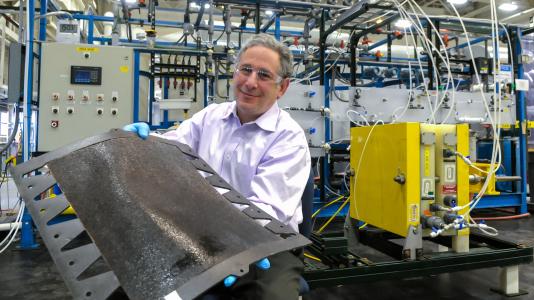
Argonne National Laboratory has received a Federal Laboratory Consortium (FLC) Award for Excellence in Technology Transfer for a separations technology that improves the processing of biomass-based feedstocks into biofuels and chemicals.
A team led by Argonne biochemical engineer Seth Snyder developed the innovative resin wafer electrodeionization technology to significantly reduce the cost of producing clean energy and of the chemicals and water used in industry.
In January 2011, Argonne executed a licensing agreement for the technology with Nalco Company in Naperville, Ill. Archer Daniels Midland (ADM) will be one of the first end users of the separations technology. Argonne, Nalco and ADM are jointly developing the technology to improve energy efficiency and environmental performance in integrated biorefineries.
The FLC recognized this partnership with a 2012 Award for Excellence in Technology Transfer. Argonne’s Snyder, YuPo Lin, Michael Henry, Edward St. Martin and Bill Ragland were among the recipients. Each year, the FLC, which comprises more than 600 federal laboratories and research centers, recognizes laboratory employees who have accomplished outstanding work in the process of transferring federally developed technology to the marketplace.
Argonne’s patented technology allows for the deionizing or the continuous removal of charged products, like organic acids from aqueous streams, and eliminates the requirement to continuously add neutralizing agents. Conventional bioprocessing technologies require significant capital expenditures or energy-intensive steps to recover these products and typically generate large waste streams. Controlling the processing costs is critical to the commercial success and growth of these product markets, especially if they are to be cost-competitive with fossil-based products.
“The implications of this resin wafer electrodeionization technology are both positive and exciting,” said Snyder. “Bio-based chemicals and fuels are a clean and sustainable alternative to oil and gas consumption. Increasing their usage would help provide a home grown energy source, reduce carbon dioxide emissions, as well as overall energy costs. Our technology could help make affordable clean and bio-based products that are not currently economically competitive.”
Funding for this work was provided by the U.S. Department of Energy’s Office of Energy Efficiency and Renewable Energy (Office of the Biomass Program, the Advanced Manufacturing Program and the Technology Commercialization Fund) and Office of Fossil Energy (Innovations for Existing Plants Program).